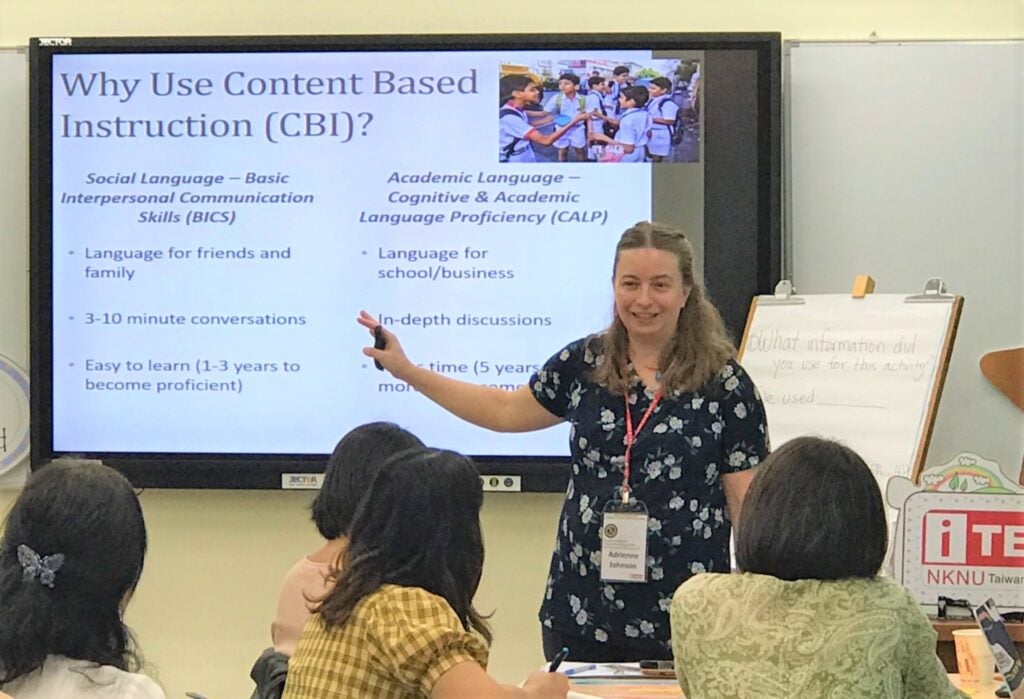
As a TESOL professional with over 20 years of experience, Alumni Ambassador Adrienne Johnson has always felt the value and enjoyment of her vocation. But it was during her first English Language Specialist project in Egypt in 2019 that she experienced a revelation of sorts. Walking through a vibrant night market at dusk in the ancient city of Luxor, Egypt, with a local teaching colleague showing her his hometown, the pair were stopped every few blocks by his former students who wanted to share updates on their lives. “Seeing how he had impacted so many students and families in the region, I came to two important insights,” Johnson reflected. “The first is that educators are among the most valuable individuals in any society. Second, working with educators in different parts of the world is incredibly fun and rewarding!”
From that moment forward, Johnson resolved both to take on new Specialist projects whenever the opportunity arose, and to share these cross-cultural teaching and learning opportunities with other U.S. TESOL professionals any chance she could. Now, as an Alumni Ambassador for English Language Programs with five Specialist projects under her belt, Johnson is fulfilling her mission to connect with, inspire, and learn from educators across the globe.
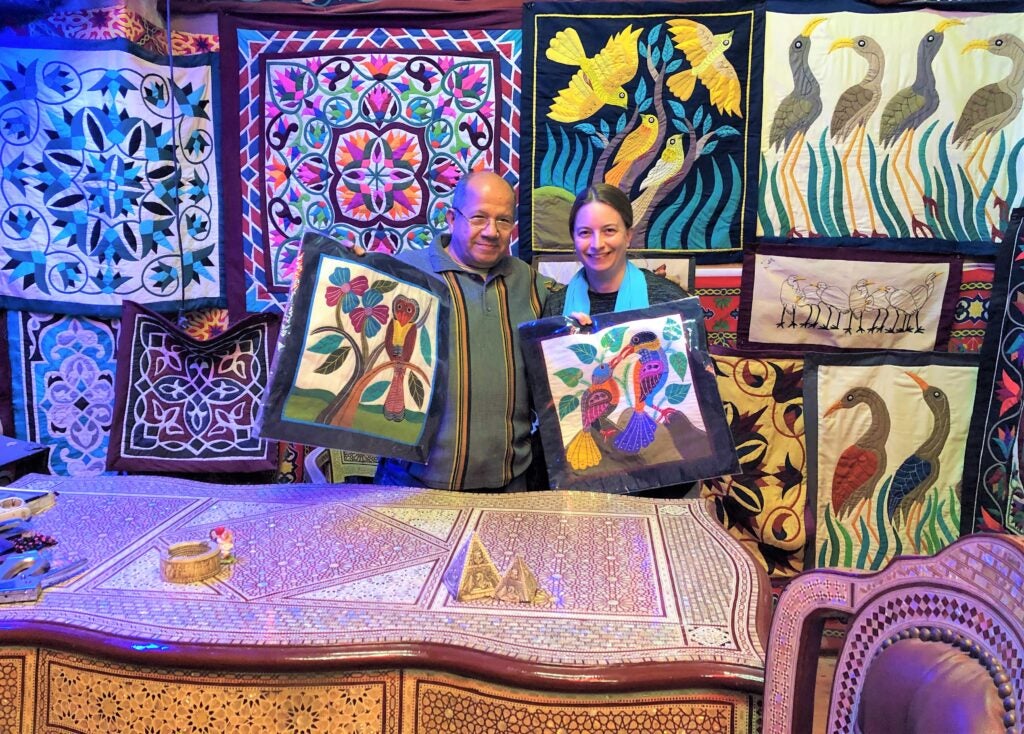
For her first Specialist project, Johnson trained primary and secondary school teachers and supervisors from across Egypt to become effective mentors who could support colleagues in becoming independent and self-reflective teachers. The six-day training equipped mentors with the skills needed to move from being evaluative and directive in their feedback to being supportive moderators of creative thinking and professional growth.
As a Specialist in Taiwan in 2019, Johnson conducted a series of interactive workshops for over 200 pre-service, in-service, and university-level educators on STEM topics. The workshops supported Taiwanese teachers’ development of the pedagogical skills and content knowledge required to plan and implement content-based instruction focused on academic English. “Through preparing for and presenting these workshops in Taiwan, I strengthened my teaching methods, activities, and scaffolds for the teachers that I train in the U.S., as well,” Johnson said. “I remain in contact with many teachers from this project, and I’ve been fortunate to continue giving virtual guest lectures for the National Kaohsiung Normal University (NKNU).”
Currently, Johnson is an associate professor and TESOL coordinator in the Education Department at Missouri Western State University, where she also serves as department chair. To accommodate new Specialist projects, Johnson highlights her availability in the program’s online application for long projects between semesters. During the academic year, she limits her availability to short-term or virtual projects that won’t interfere with her primary duties at her university. “I’m fortunate to have a supportive employer who understands the benefits of my Specialist projects to the university and our students,” Johnson said.
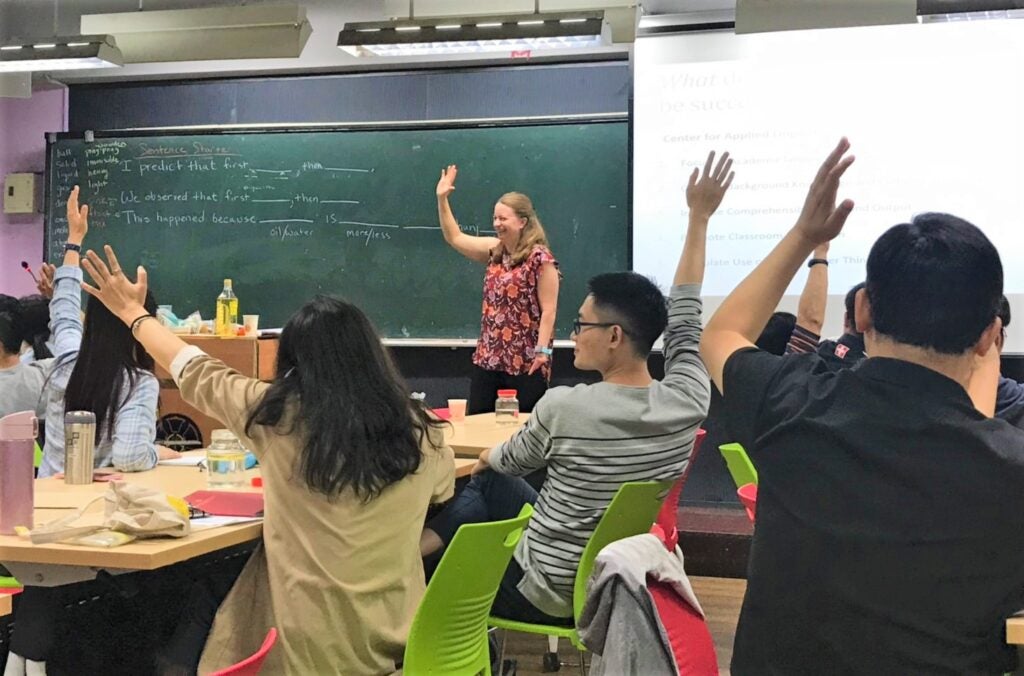
Teacher training session at the National Taiwan Normal University (NTNU), Taipei, Taiwan
For her Specialist project in Kuwait in 2020, Johnson facilitated an online series of 12 professional development sessions over the course of four weeks for approximately 240 teachers, supervisors, and heads of department in a train-the-trainer model. Participants were divided into four groups, with each group learning new skills and techniques that they could then share with their colleagues in a jigsaw approach. The weekly trainings were devoted to a variety of best practices for teaching young learners remotely, including engagement and active learning strategies, collaborative learning approaches, and formative assessment techniques. “This project was a delight in that it challenged me to hone my own virtual teaching techniques to meet the unique needs of my Kuwaiti colleagues and their students,” Johnson said.
As a Specialist in Turkiye in 2022, Johnson collaborated with her co-Specialist, David Malatesta, on leading a five-day training for teachers participating in the Making English Come Alive (M.E.C.A.) Summer Institute. The group focused on strategies for implementing ‘quick and easy’ low-prep learning activities, which are crucial for busy teachers. In addition to introducing a number of tech tools to help teachers increase engagement and participation in their classrooms, many of the strategies came from the American English Monster Book of English Teaching Strategies, and the American English Activate! Board Games to teach English grammar.
“I am amazed at how many positive memories I have from this relatively short program,” Johnson said. “In two weeks, I was able to get to know nearly 100 unique, kind, talented, and dedicated Turkish teachers. Our workshops were filled with laughter from the many funny moments that occur naturally when you learn language through play, a well-timed joke, or a snafu that became a teachable moment.”
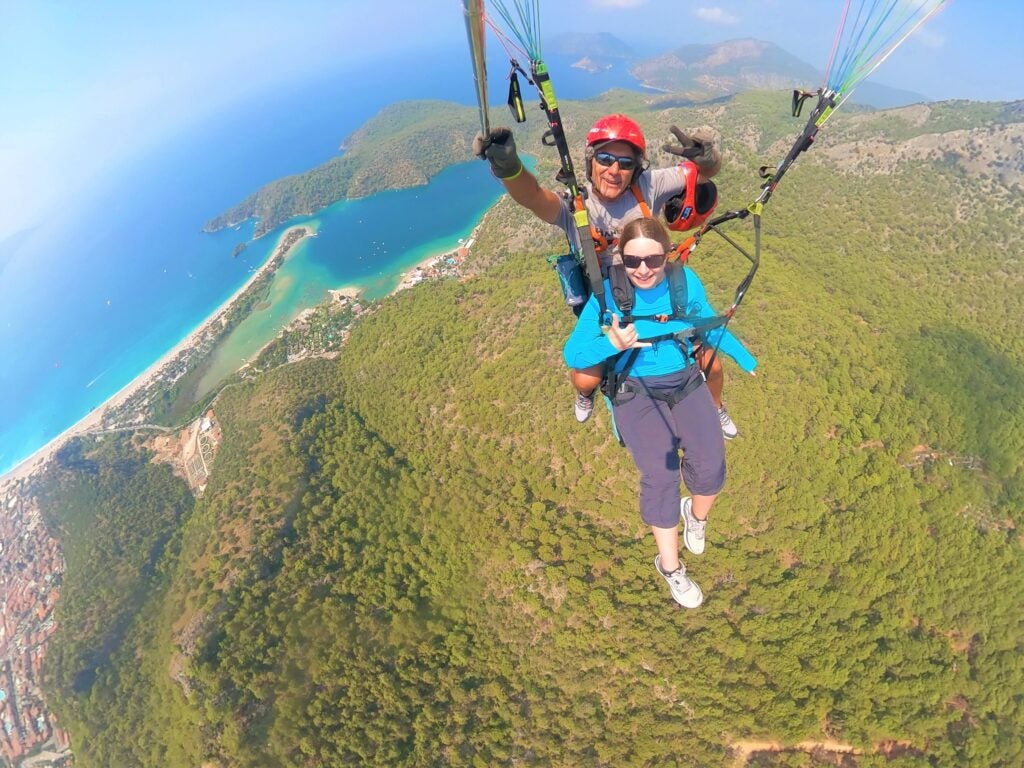
Invaluable experiences such as these are what Johnson brings back to the courses she teaches for in-service P-12 teachers in the Masters of Applied Science (M.A.S.) in Assessment TESOL program, as well as courses for undergraduate pre-service teachers in early childhood education, elementary education, special education, secondary education, and K-12 education. While Johnson’s background as a P-12 teacher helped to prepare her for her current role, she credits her work as a Specialist for enabling her to develop a better understanding of her students’ learning needs and cultural backgrounds. “The region of Missouri where I work has a very diverse population of English learners, many of whom are refugees or students with limited or interrupted formal education,” Johnson said. “Through my Specialist projects, I’ve had opportunities to visit regions with which I had limited previous experience and to interact with and learn from individuals from diverse backgrounds similar to those of students in my local community.”
As co-chair for TESOL International Association’s Standards Professional Council (SPC), Johnson works on providing materials, standards, and guidance relevant to a global EFL audience. In partnership with her SPC colleagues, Johnson has created an instructional ‘zip guide’ titled “Welcoming and Supporting Multilingual Newcomers” that will be published in 2023 by TESOL Press and featured at the 2023 TESOL International Convention. In her role as Chair for MIDTESOL’s Socio-Political Concerns and Professional Standards, Johnson helps educate elected officials about the needs of English language learners and teachers, including attending the annual TESOL Advocacy Summit in Washington, D.C., and setting up meetings on Capitol Hill.
Through my Specialist projects, I’ve had opportunities to visit regions with which I had limited previous experience and to interact with and learn from individuals from diverse backgrounds similar to those of students in my local community.
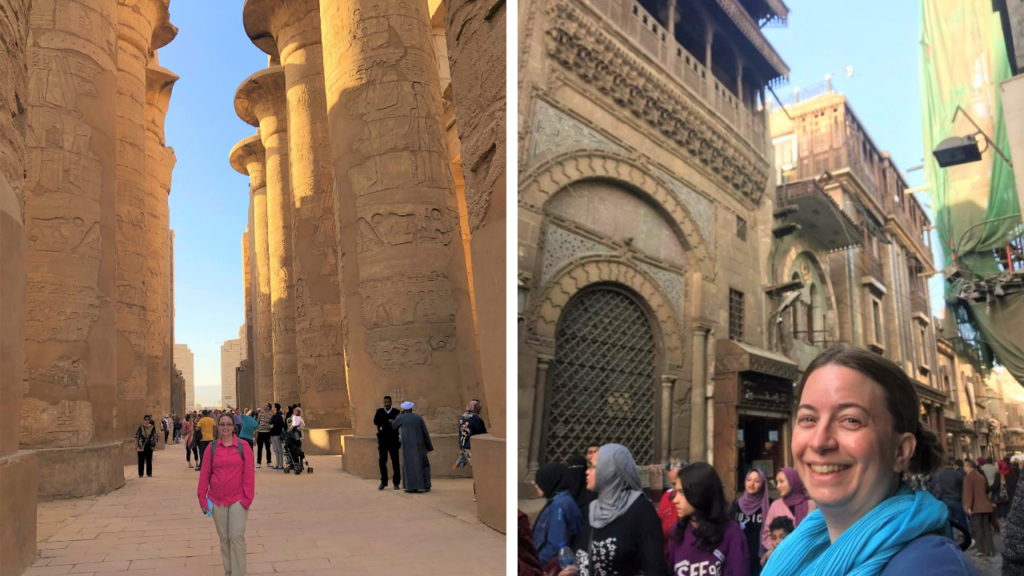
(left) Karnak Temple Complex near Luxor, Egypt; (right) walking the streets of Cairo, Egypt with pigeon farming towers in the background
With a deep interest in history, art, and religion, Johnson always takes advantage of the cultural learning opportunities in her host countries, visiting UNESCO World Heritage sites and museums. “When on assignment, I use my ‘rest days’ to take in the beauty of the new places I’m in and increase my understanding of our complex and diverse world,” Johnson stated. She described one memorable outing of visiting Sun Moon Lake in Taiwan with a local colleague and biking through the surrounding hills as the sun was setting. “It was even more beautiful than I could have imagined,” Johnson said. “In fact, we got so swept up in admiring the scenery that we ended up riding the last 30 minutes in near darkness through the woods!”
For Johnson, it all comes back to having these special moments with her global colleagues. She credits the relationships she’s built with helping to strengthen her cross-cultural communication skills, and gain the confidence to present to worldwide audiences. “In every project, I’m in awe that I get to meet and learn with teachers from all over the world,” she said. “And I love sharing my experiences with family members, friends, neighbors, colleagues, students, and even strangers I meet in various contexts.” Johnson also looks forward to hearing about the experiences of her local U.S. TESOL colleagues as they pursue new opportunities, too. “At regional conferences, I’m meeting so many new educators with such rich teaching experiences,” she said. “They’re going to make a great impact on the world.”
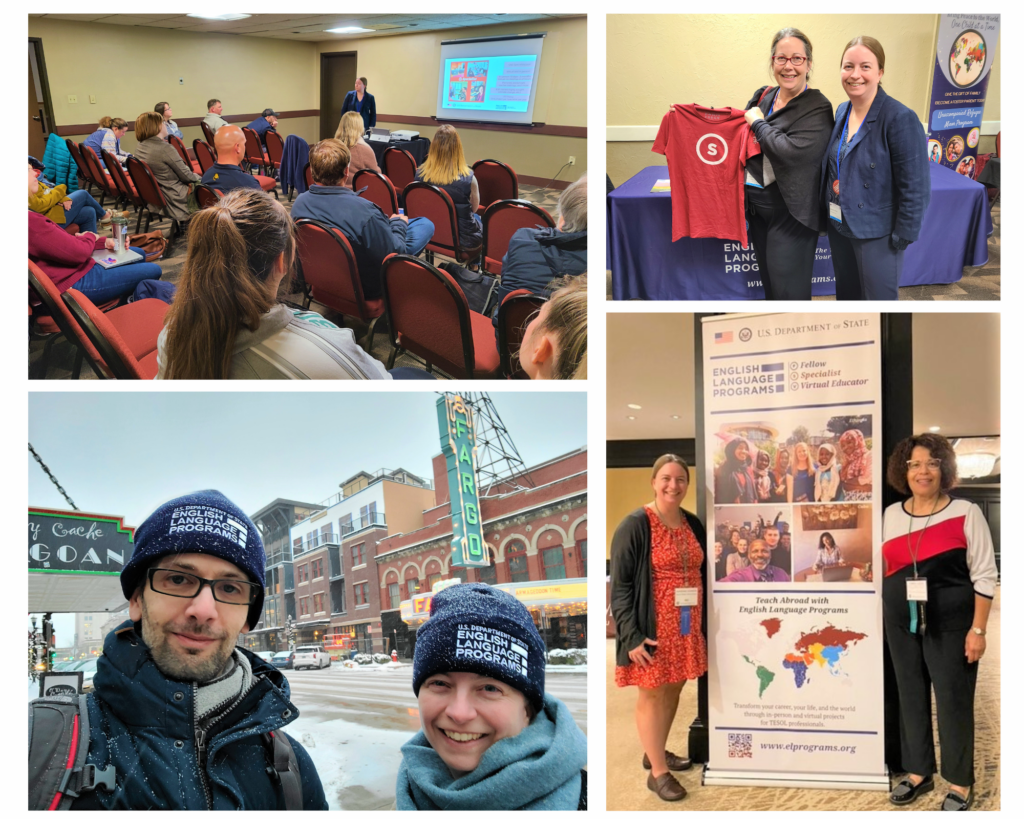
Adrienne Johnson has served as an English Language Specialist in Egypt, Taiwan, Kuwait, and Turkiye, both virtually and in-person. Johnson specializes in training teachers of young P-12 English learners in content and language integrated instruction using active learning methodologies. Johnson has taught English learners in elementary and secondary settings in the U.S. as well as overseas. Johnson has a doctorate in linguistics and currently trains pre-service and in-service teachers at Missouri Western State University where she is an associate professor, graduate TESOL coordinator, and the chair of the education department.
Stay tuned for our next featured Alumni Ambassador story with Cristyn Elder.
